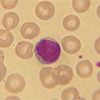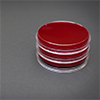
- Home
- Clinical Chemistry Tests
- Faecal Elastase-1
Faecal Elastase-1
Specimen Volume
500 mgSpecimen Transport
First Class PostSample Preparation
Turnaround Time
15 daysSample Processing In Laboratory
UsualSample Stability
Stable when stored at 4oC for 9 days (Also stable at room temperature for 9 days)General Information
Pancreatic elastase is secreted by acinar cells in the pancreas. It is not degraded during transfer through the intestine, therefore the faecal concentrations reflects pancreatic exocrine function.
Faecal elastase is a non invasive assessment of pancreatic exocrine insufficiency. Its measurement has been shown to correlate well with more invasive 'tube' and 'tubeless' tests of exocrine pancreatic function such as the Secretin Pancreozymin test and the Pancreolauryl test.
Faecal elastase may also have role in the assessment of cystic fibrosis patients.
Administration of bovine or porcine pancreatic supplements do not interfere with the test for faecal elastase, which is a distinct advantage over other pancreatic enzymes such as trypsin, chymotrypsin or amylase.
Very wet stool samples may give falsely low elastase levels and require confirmation on a formed sample to confirm pancreatic exocrine insufficiency.
Patient Preparation
None
Notes
None Given
Reference Range
Normal: >200 ug/g
Mild to moderate exocrine pancreatic insufficiency: 100 – 200 ug/g
Severe exocrine pancreatic insufficiency: <100 ug/g
Source of Reference Range
Phillips ME, Hopper AD, Leeds JS, et alConsensus for the management of pancreatic exocrine insufficiency: UK practical guidelinesBMJ Open Gastroenterology 2021;8:e000643. doi: 10.1136/bmjgast-2021-000643Specifications
- EQA Status: UKNEQAS
- EQAS Scheme: Yes
Creation Date
Monday, 08 August 2011Modification Date
Thursday, 29 February 2024General Information
Location of Laboratories
Copyright UHB Pathology 2018
Protection of Personal Information – Clinical Laboratory Services comply with the Trust Data Protection Policy and have procedures in place to allow the Directorate and it’s employees to comply with the Data Protection Act 1998 and associated best practice and guidance.
University Hospitals Birmingham medical laboratories at Queen Elizabeth Hospital, Heartlands Hospital, Good Hope Hospital and Solihull Hospital are UKAS (United Kingdom Accreditation Service) accredited to the ISO 15189:2012 standard. For a list of accredited tests and other information please visit the UKAS website using the following link: https://www.ukas.com/find-an-organisation/
- Molecular Pathology is a UKAS accredited medical laboratory No. 8759
- Biochemistry is a UKAS accredited medical laboratory No. 8910
- Haematology and Transfusion is a UKAS accredited medical laboratory No. 8784
- Clinical Microbiology is a UKAS accredited medical laboratory No. 8760
- Cellular Pathology is a UKAS accredited medical laboratory No. 10141
- Musculoskeletal laboratory is a UKAS accredited medical laboratory No. 9897
- Heartlands, Good Hope and Solihull Hospital pathology laboratories are a UKAS accredited medical laboratory No.8217.
Tests not appearing on the UKAS Schedule of Accreditation currently remain outside of our scope of accreditation. However, these tests have been validated to the same high standard as accredited tests and are performed by the same trained and competent staff.
For further test information, please visit the test database: http://qehbpathology.uk/test-database
For further information contact Louise Fallon, Quality Manager, 0121 371 5962
 Biochemistry
Biochemistry Haematology and Transfusion
Haematology and Transfusion Clinical Microbiology (Including Virology)
Clinical Microbiology (Including Virology) Cellular Pathology
Cellular Pathology General Information
General Information Molecular Pathology
Molecular Pathology